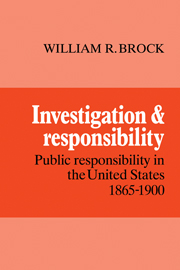Book contents
- Frontmatter
- Contents
- Dedication
- Preface
- 1 Public responsibility
- 2 Theory and practice
- 3 Public responsibility and the law
- 4 The charities of the State
- 5 The boards of public health
- 6 The bureaus of labor statistics
- 7 The railroad commissions
- 8 Toward the future
- Appendix 1 State agencies: some representative samples
- Appendix 2 Checklist of reports issued by boards of state charities, boards of public health, bureaus of labor statistics, and railroad commissions, 1865–1900
- Essay on sources and historiography
- Bibliography
- Index
4 - The charities of the State
Published online by Cambridge University Press: 03 May 2010
- Frontmatter
- Contents
- Dedication
- Preface
- 1 Public responsibility
- 2 Theory and practice
- 3 Public responsibility and the law
- 4 The charities of the State
- 5 The boards of public health
- 6 The bureaus of labor statistics
- 7 The railroad commissions
- 8 Toward the future
- Appendix 1 State agencies: some representative samples
- Appendix 2 Checklist of reports issued by boards of state charities, boards of public health, bureaus of labor statistics, and railroad commissions, 1865–1900
- Essay on sources and historiography
- Bibliography
- Index
Summary
Public responsibility for the afflicted without means of support had deep roots in English and American traditions, but normally as the last resort after personal savings, family support, and private charity had been exhausted. Modern times have seen a shift of responsibility from the community to the center, and from private to state institutions. In this transition the boards of state charities, which came into existence in so many states, played a crucial part.
The Civil War left its legacy of domestic misery among widows, orphans, and maimed veterans, and almost before this problem had receded Americans became aware of a rising tide of pauperism. A pauper was a person wholly dependent upon public support; he or she might have reached this condition because of old age, chronic illness, feeble-mindedness, or physical incapacity. Or the cause might be drunkenness, incurable idleness, or a record of crime which made the pauper unemployable. Finally there might be temporary paupers – persons thrown out of work by slack trade or by changes in technology – who might be expected to return soon to independence. Soon after 1870, and with increasing frequency during the depression of 1873, Americans became aware of large numbers of paupers who fitted readily into none of these categories. They were able-bodied, willing to work, but could find no employment.
Whatever the causes of pauperism, nineteenth-century Americans were convinced that it was a monstrous evil that would debilitate society if allowed to grow unchecked.
- Type
- Chapter
- Information
- Investigation and ResponsibilityPublic Responsibility in the United States, 1865–1900, pp. 88 - 115Publisher: Cambridge University PressPrint publication year: 1984



